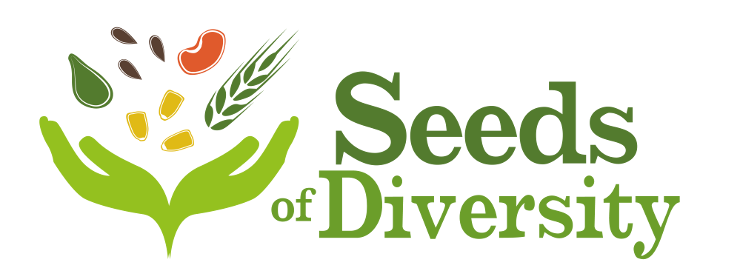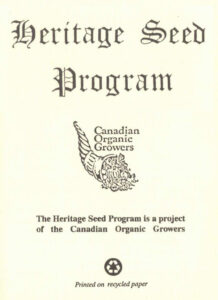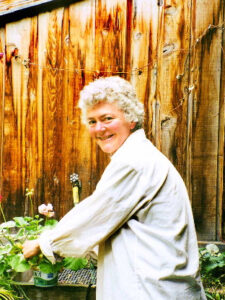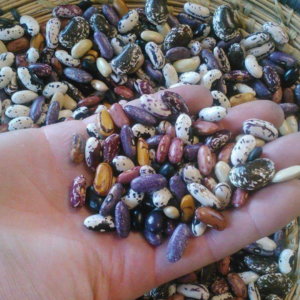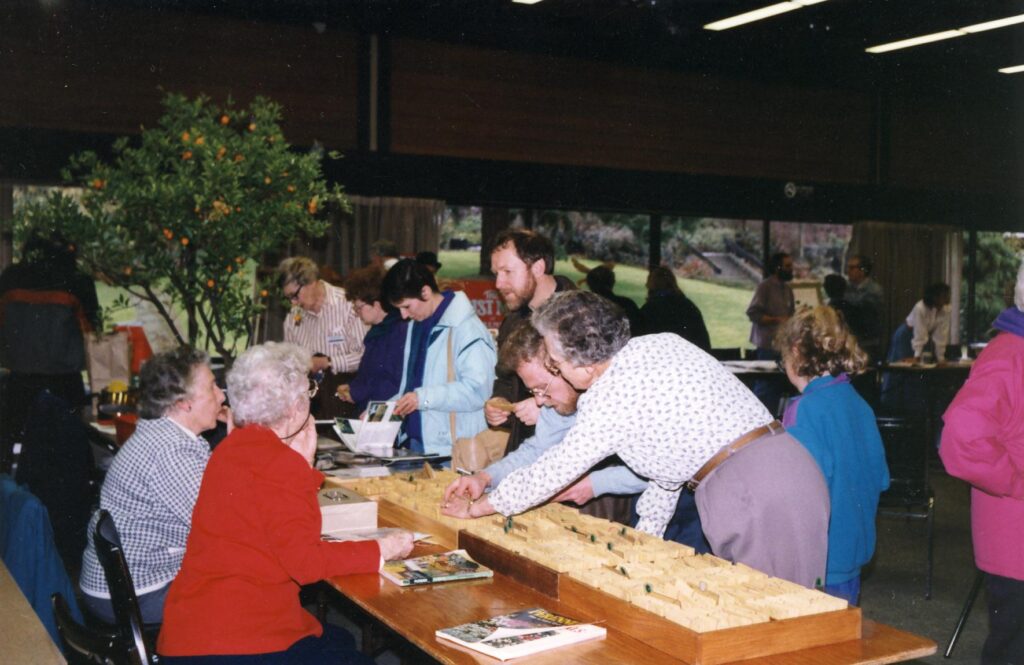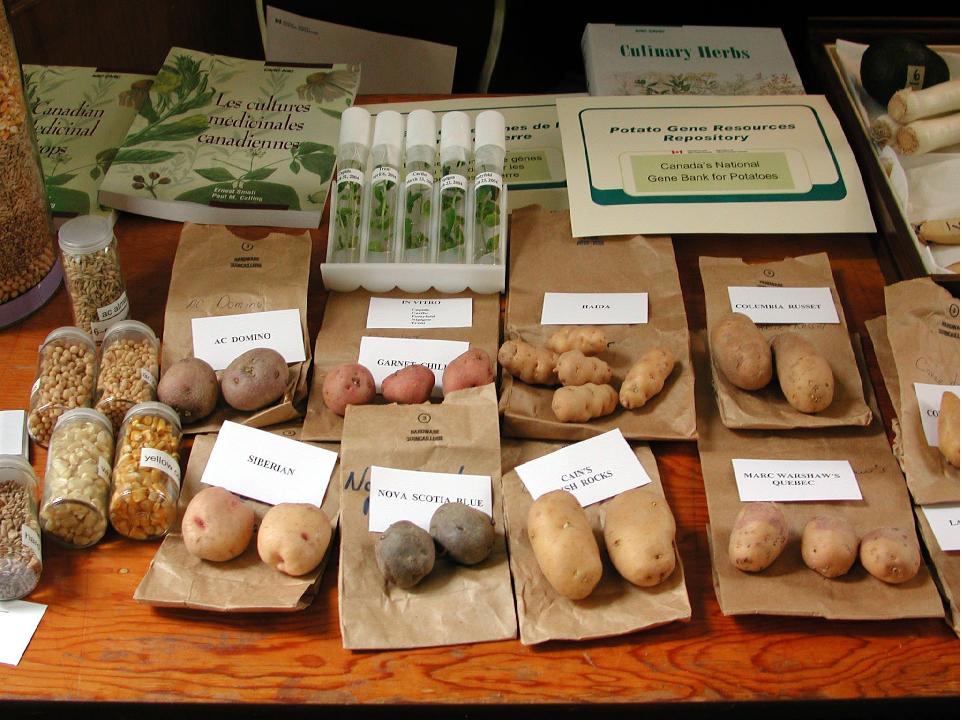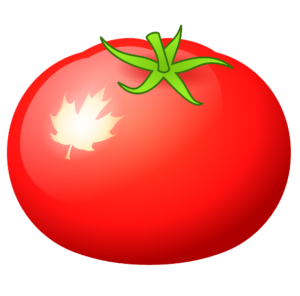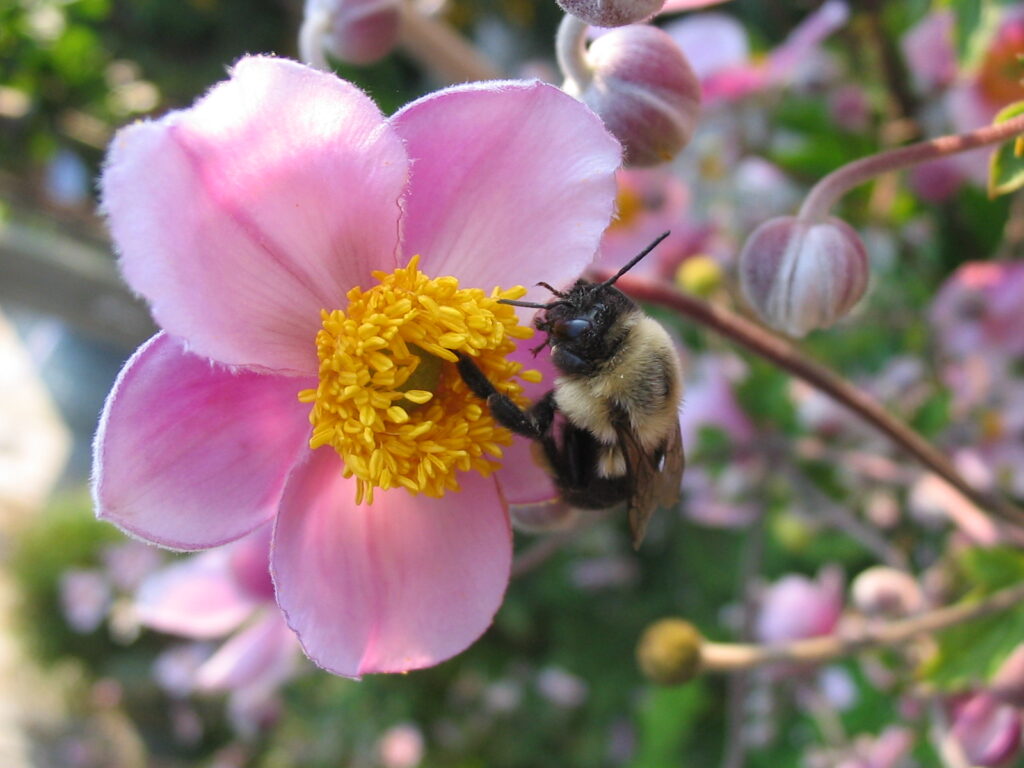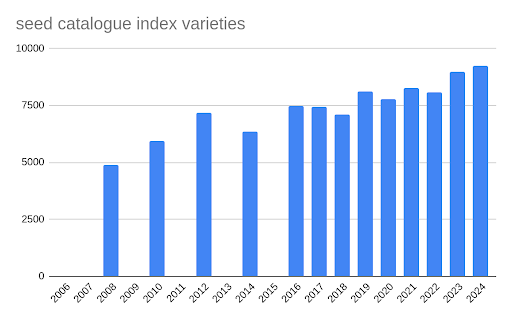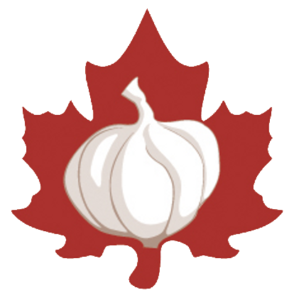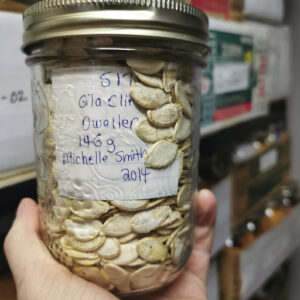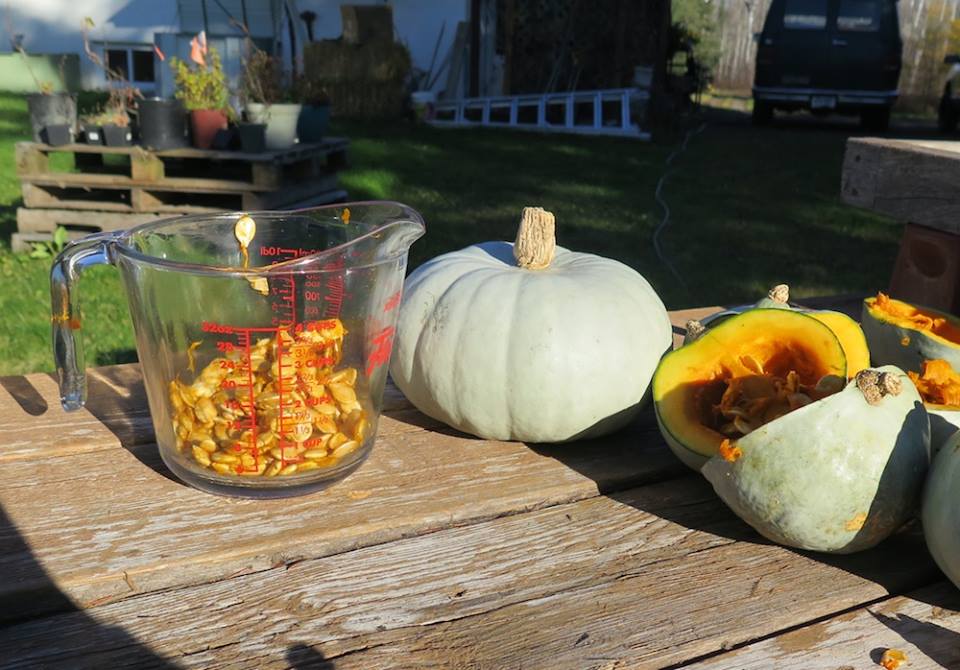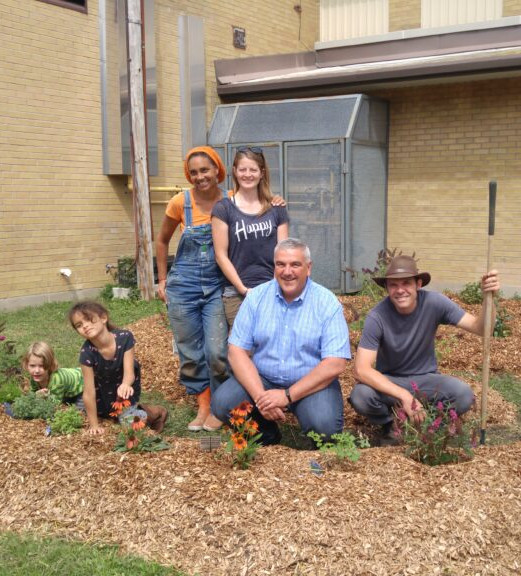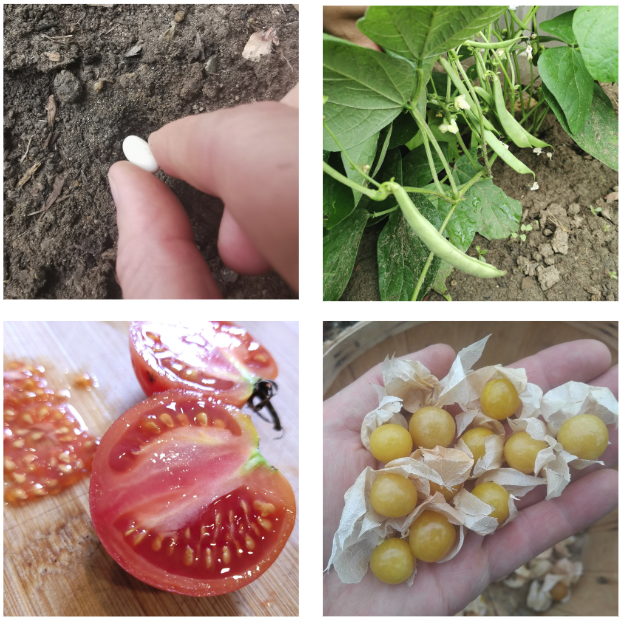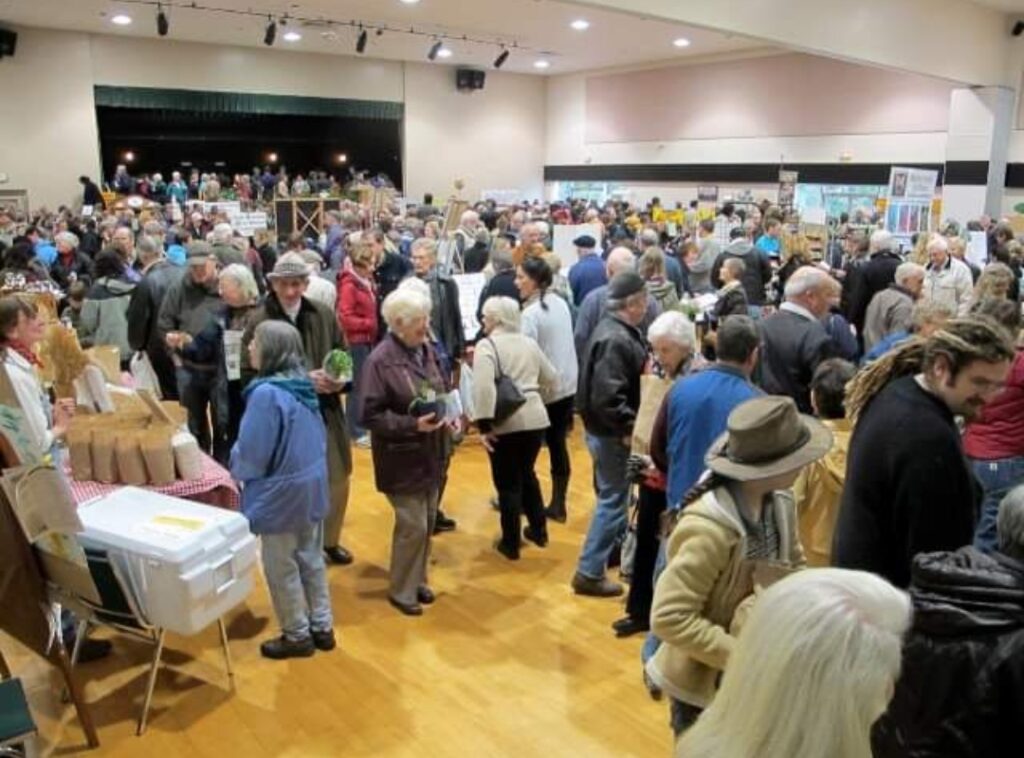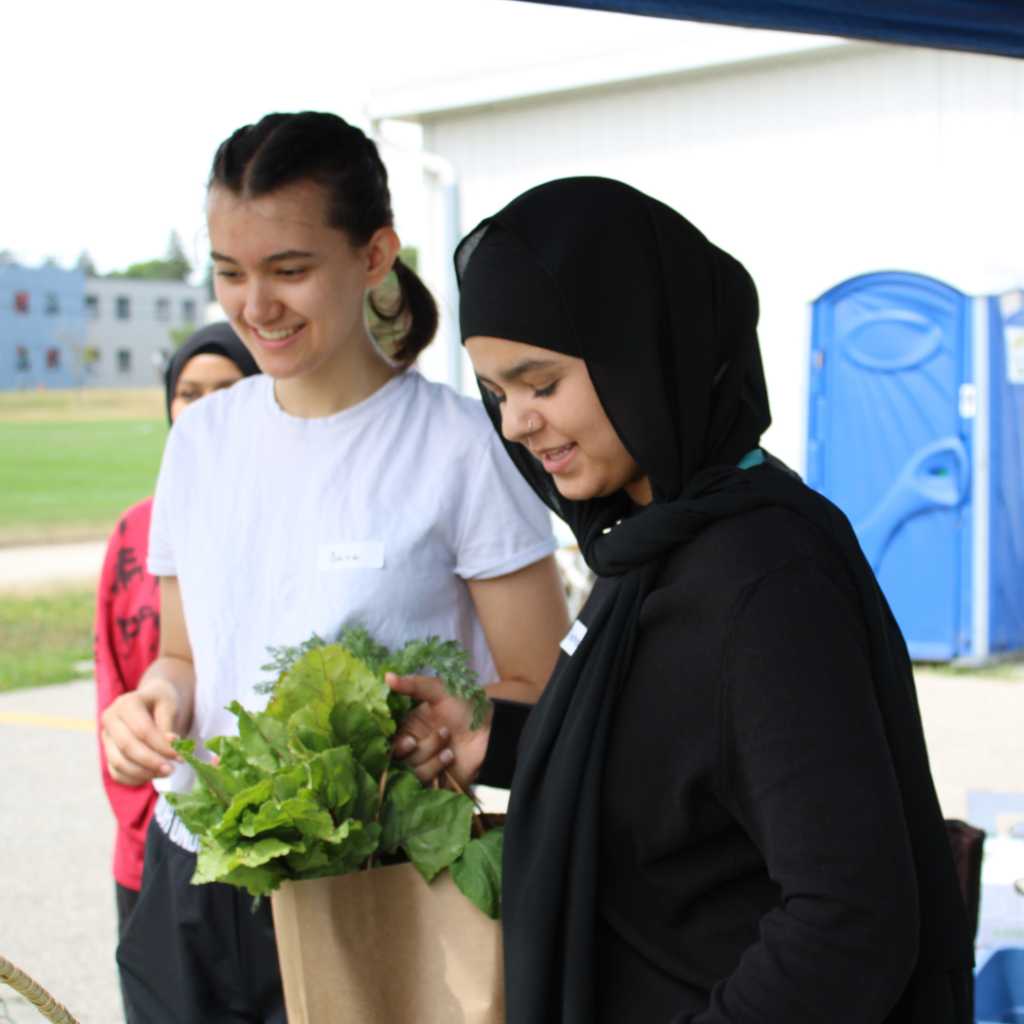
Seeds of Diversity began as an idea born in the back of a Chevy in 1984. An excited group of seed savers were returning home from a conference, hosted by Canadian Organic Growers, about the loss of genetic diversity in food crops. They had heard from farmers who weren't able to find the seed varieties they wanted, gardeners whose favourite varieties had been dropped from leading seed catalogues, and about the general trend of erosion of genetic diversity in our food crops.
Inspired by the work of seed savers in Canada and around the world, our founders imagined the "Heritage Seed Program", modeled on groups like the U.S.-based Seed Savers Exchange. Canadian Organic Growers initiated that program to help salvage Canada's crop-plant heritage, with Alex Caron as coordinator.
This was the beginning of what would later become Seeds of Diversity.
The Heritage Seed Program was a lot of work for a few volunteers, but it was soon reinvigorated by Heather Apple, a long-time organic gardener, past president of the Durham, Ontario chapter of COG, and a Seed Savers Exchange contributor.
Her aim was to develop it as a grass-roots seed-saving organization modelled after the Seed Savers Exchange and beginning with an announcement in August 1988, she produced a separate newsletter for the program which became a magazine by December 1988.
Under Heather's dedicated leadership, the Heritage Seed Program thrived, grew to over 2000 members across Canada, received a 5-year grant from the Weston Family Foundation to get those members busy saving seeds, and inspired many more volunteers to help.
Our Seed Exchange has always been the heart of Seeds of Diversity. Currently, our members exchange around 3000 different varieties of seeds every year, saved from their gardens and offered to members from coast to coast.
The purpose is to keep growing varieties that aren't available from seed companies, and to make the seeds available so others can grow them too!
Right from the start, our first Member Seed Exchange had the very same intentions. 14 members offered 141 varieties, knowing that the only way their favourite heritage seeds would continue to be available were if seed savers re-grew more seeds.
They were part of the seed conservation solution, and we've kept on doing that ever since!
Inspired by Pat Mooney’s book “Seeds of the Earth,” Sharon Rempel (Chief Interpreter, Special Events Coordinator and head gardener at The Grist Mill at Keremeos) realized that people had to become involved in keeping their ‘folk’ varieties alive. Corporations were buying up seed and regulations prohibiting saving and selling unregistered varieties were becoming more prevalent globally.
On February 14, 1990 the vision became a reality. Curator Roy Forster from the Van Dusen Botanical Gardens hosted Canada’s first Seedy Saturday. Over 500 people attended the event!
The first Seedy Saturday organizers included: Dan Jason from Salt Spring Seeds who sold and traded ‘open pollinated’ seeds; USC Canada’s Vancouver office person Mary Lindsay showing the ‘Seeds of Survival’ program; Catherine Gabriel from Health Action Network; and two living history sites including The Grist Mill at Keremeos. Heritage fruit groups like NAFEX and B.C. Fruit Testers and the University of British Columbia plant science department offered advice and technical help. Many small seed companies attended.
The Heart of Seedy Saturday was and is the Swap Table. It was a place for people to sit and chat, swap their seeds and tell the stories of best cultivation for the plant, the story of how they got the seed, how the variety got its name and also how to use the plant in cooking. Volunteers taught people how to label seed packets to ensure the integrity of the variety, including its name, would be conserved. Small seed company owners have adopted many of the varieties into their collections.
In the years that followed, Seedy Saturday and Seedy Sunday events began popping up, a slow but mighty movement. By 2009 there were 51 events from coast to coast.
Today, nearly 35 years later, more than 170 Seedy Saturday and Seedy Sunday events are held in communities across Canada. Find one near you on the Seeds of Diversity Events page and check back as winter approaches because it's filling up with new events daily!
Only 7 years old, the Heritage Seed Program (later known as Seeds of Diversity) formalized a cooperative agreement with Agriculture Canada's national seed bank to exchange seeds and assist each other to grow, store, and conserve seed diversity.
PGRC, a department of Agriculture Canada, operates a collection of over 100,000 food crop varieties that are available mainly for research and plant breeding. Seeds of Diversity is able to access seeds from this collection to help farmers and gardeners multiply varieties that are not available elsewhere, and we also donate some of our members' rarest varieties to PGRC to ensure that they are backed up in the best storage conditions available anywhere.
Our partnership with PGRC has led to several growouts, pairing backyard seed savers with varieties that needed to be re-grown for the government collection, and our growers have benefited in turn from access to those irreplaceable varieties.
Tomatoes are originally from South America but hundreds of varieties have been bred and adapted in Canada to meet our short season and diverse climates. In 1994, a group of members realized that most of these varieties were in danger of disappearing, and encouraged gardeners to discover, multiply, and share seeds of Canadian tomatoes.
Over time, many of those varieties have become available again from a handful of seed companies, and through our Member Seed Exchange, but we still have work to do. In 2024 we involved 118 members in a Community Seed Growout for Canadian tomato varieties, so you might have grown one of these treasures yourself!
If you'd like to grow a Canadian tomato, search our Member Seed Directory and watch for our next Community Seed Growout because we'll grow them again!
After eleven years as the Heritage Seed Program with Canadian Organic Growers, we had grown to the point that it was time to become an independent non-profit corporation.
At first, we wanted to incorporate as the Heritage Seed Program, but that was not allowed because the phrase "Heritage Seed" was trademarked by a bread company. We chose the name Seeds of Diversity, and now we think that was a better name anyway because it stands for progress as well as heritage.
Yes, we were very surprised and concerned that somebody had trademarked "heritage seed". If you're curious, here's the Canadian Trademarks Database page. The trademark was only removed because of non-renewal in 2024 !
Seeds of Diversity was the Canadian NGO participant in negotiations of an important international treaty that governs how countries share and exchange seeds.
The International Treaty on Plant Genetic Resources for Food and Agriculture ensures that government seed banks around the world will conserve and exchange seeds fairly and share the benefits from their use, especially with countries that are the origins of our global crop plants.
Our role was mainly in the negotiations of "Access and Benefits Sharing", which turned out to be quite complicated. We also participated in the crucial inclusion of Farmers' Rights in the Treaty.
In the words of the FAO: "In Article 9, the International Treaty recognizes the enormous contribution that local and indigenous communities and farmers in all regions of the world – particularly those in centres of origin and crop diversity – have made and will continue to make for the conservation and development of plant genetic resources, which constitute the basis of food and agricultural production throughout the world. It leaves the responsibility for implementing Farmers' Rights with national governments, and lists measures that could be taken to protect, promote and realize these rights".
Even with the Treaty in place, it is still up to all of us to ensure that national governments protect Farmers' Rights in our laws and regulations about seeds. That work is still urgent and crucial today.
Overall, this Treaty is a very important step toward global seed sharing. It's very important for Canada to be part of an open and equitable world seed bank system, because most of the food crops we grow don't originate here. Wheat, oats, soy beans, potatoes, and most vegetables come from other parts of the world where seed banks have genetic diversity that we will need to keep Canada's food systems growing.
Seed savers know a lot about bees and pollination, because we have to control pollination to save the seeds we want.
So when honey bee colonies started to collapse, and farmers and gardeners became concerned about protecting native bees, Seeds of Diversity was a natural fit for a pollinator protection program. Trusted by both the agricultural and ecological communities, and with a national scope, we initiated a PollinatorWatch citizen science project with Environment Canada.
Through the early 2010s we partnered with the North American Pollinator Protection Campaign (NAPPC) and advocated for pollinator friendly farming and gardening.
Another national non-profit, Pollinator Partnership Canada, grew from the parent organization of NAPPC, and became an appropriate partner to take on this work.
Every year we re-create an index of the garden vegetable varieties available from seed companies in Canada. The complete list is available for free on our web site at https://seeds.ca/sources and at https://seeds.ca/seedfinder
Besides offering a useful Canada-wide seed finding service for gardeners, our catalogue index has an important purpose: it helps us know which varieties are in the greatest need of rescue, back-up, and rejuvenation by seed savers.
Also, with records going back over 20 years, we can see trends in commercial availability of every vegetable crop in Canada. This really helps all of us to understand food diversity and seed security.
Garlic is more difficult to conserve than seeds. Seeds can be kept in a jar or an envelope for year, sleeping until you sow them, but garlic has to grow continuously from each year to the next.
To back up our members' garlic varieties, we established a collection based in Ontario, with the intention of encouraging members to grow and re-offer varieties every year. Some varieties came from our Member Seed Exchange, but many were adopted from other collectors.
At first, we mailed full-size bulbs to growers, which was expensive. Since 2013, we've found it much more economical to mail the bulbils from the tops of the plants. Also, that method can help prevent garlic diseases and pests from being transmitted, so the garlic can grow healthier as we share it!
After 24 years of running Canada's largest heritage seed exchange, Seeds of Diversity started a bold new project: a permanent Seed Library collection to:
- Back up members' rare seeds
- Help grower members focus their conservation efforts on the rarest varieties
- Help distribute and document the most endangered varieties.
The Seed Library began its first year of operation with only 240 varieties, thanks to the backing of many donations to permanently adopt varieties into the collection.
As of 2024, the Seed Library is a collection of over 2900 regionally-adapted and rare seed varieties, backing up the work of our member seed savers and Canadian heritage seed companies. Seeds of Diversity's member seed growers multiply these seeds to keep them viable and available for future gardeners and farmers.
Seeds of Diversity was a partner in a five-year NSERC Strategic Network that studied the growing problem of pollinator decline in agricultural and natural ecosystems in Canada.
Experts in entomology, ecology, plant reproductive biology, genomics, and economics at 26 universities joined forces explore the full scope of pollinator health and conservation, gene flow in plants, the impact of climate change, and the economics of pollination.
In 2010 a group of organic seed growers and sellers gathered in Montreal to discuss how to create an economically viable and ecologically sustainable organic seed supply for Eastern Canada.
This meeting grew into a series of conferences, farm tours, informal gatherings, partnerships with organizations working for Canadian seed security, and formed a network of farmers helping farmers produce more high-quality certified organic Canadian seeds.
Many of the home-grown seed companies that you know in Ontario, Quebec, and the Atlantic provinces were part of, or were inspired by, ECOSGN.
The Bauta Family Initiative on Canadian Seed Security was conceived as a network of organizations working with seed producers to advance agricultural biodiversity across Canada. Officially launched in 2013 with USC Canada (now known as SeedChange) as the national lead organization, Seeds of Diversity as a national partner, and four regional organizations providing on-the-ground support, the network gave an immense boost to Canadian farmers working to increase the quality, quantity, and diversity of seeds they save, adapt, and breed.
The Bauta Initiative has provided training and networking resources for seed growers, support for seed-saving workshops at Seedy Saturdays and Seedy Sundays, and through national research, uncovered the most comprehensive picture yet of the seed and food biodiversity sector in Canada. As a partner with the Bauta Initiative, with funding through the W. Garfield Weston Foundation, Seeds of Diversity has developed its seed conservation and field testing techniques, supported community seed libraries and Seedy Saturday events across Canada, and extended its reach to seed savers in communities from coast to coast to coast.
First published in 1989, Seeds of Diversity's seed saving book, "How to Save Your Own Seeds" has been a longstanding educational tool for seed savers. In 2012, it underwent a major transformation for its 6th edition, including the addition of photos and charts.
As of 2024, more than 11,000 copies in English and French have been sold; a Dutch translation is sold by a European publisher, too.
The Vegetable Seed Producers Network was a program organized by Seeds of Diversity and The Bauta Family Initiative on Canadian Seed Security. The programs served two functions:
- To produce vegetable and specialty crop seeds according to industry best practices, which could then be pooled for bulk-scale supply to vegetable farmers, gardeners, and other growers, and
- To ensure that our seed collection remained viable and of the highest quality possible, by continually supplying fresh seeds to replenish seed stocks as required.
The project aimed to address the need for bulk scale production of vegetable and specialty crop seed in Canada. There is a strong demand for domestically produced seed, but most of the vegetable seed grown in Canada is sold in small packet sizes for gardeners. The next big step is to scale up production to provide farm-scale, bulk quantities.
Since 2015 our network has grown from 20 to 55 producers (and counting!). Participating farmers grow seed from this list of vegetables, and note their observations on standardized Crop Descriptor Forms. A sample of seeds is sent back to us and stored in Seeds of Diversity’s Seed Library in Hillsburgh, Ontario at Everdale, helping to keep a wide diversity of seeds in circulation and available to the public. The forms are sent back to us and posted so that others can learn from the observations each grower made about the crops.
Inspired by the 2016 School Garden Scan of Waterloo Region and the increasingly apparent need to engage young people in food literacy and food systems sustainability work, Seeds of Diversity secured funding to support school food garden builds, led by coordinator Jill Byers.
During 2017-2018, this project, aptly named Waterloo Region School Food Gardens (WRSFG), provided $1500 grants to 12 elementary and high schools to build food producing gardens on school grounds.
In 2019, Seeds of Diversity was awarded a three-year Ontario Trillium Foundation grant to continue this work. During these years, an additional 35 gardens were constructed, expanded, and/or reinvigorated at schools and early learning centers throughout Waterloo Region, for a total of 47 gardens in the network by the end of 2022. In addition to the initial builds, WRSFG staff supported learning activities, annual inputs, and summer maintenance for gardens in need. This work wasn't without its challenges, as the COVID-19 pandemic made many school grounds inaccessible for long periods of time. It was during the difficult and ever-evolving pandemic period that Youth in Food Systems was conceptualized.
Although we often say that Seeds of Diversity’s purpose is to grow rare seeds, our primary goal is actually to grow more seed savers!
Since 2019 we’ve engaged a few hundred members every year in a series of seed-growing projects.
Here are a few:
- Open Source Seed varieties
- Save an Old Tomato
- Dwarf Tomato Growout
- Breed a Better Ground Cherry
- Rare Variety Challenge
- Beans for Canadian Climates
- Canadian Tomato Grow-out
In 2020, almost half of Canada’s Seedy Saturday events had to cancel due to COVID-19, and many at the last moment. Seeds of Diversity saw what was occurring and decided to take action. In October 2020, 190 known Seedy Saturday organizers were contacted, and more than 100 of them responded accepting and welcoming additional support to navigate this unprecedented era of virtual gatherings.
Over the next five months, Seeds of Diversity held organizer idea sharing meetings over Zoom, put together a series of virtual webinars, worked on ways to safely exchange seeds, helped to promote local seed companies, and provided tech support to events. This was on top of the regular promotions and seed packet offerings that Seeds of Diversity has long been known for.
In 2021 more than 80 virtual events took place from coast to coast. The following year, 2022, with similar supports, more than 100 took place. Once 2023 rolled around, in-person gatherings were again gaining traction as restrictions were lifted, allowing these cherished events to return to their beloved face-to-face formats.
On December 1, 2022, Youth in Food Systems (YFS) became the official youth program of Seeds of Diversity. Before that, it unofficially launched under WRSFG in April 2021, as a response to the COVID-19 pandemic. When school grounds were inaccessible, and therefore school garden work put on hold, staff wondered what it would take to create a youth-focused - or better yet, youth-driven - program online.
And so it began.
Throughout 2020 and 2021, while a lot of in-person programming was suspended, staff focused on finding ways to support youth in connecting with food systems and learning about sustainability in a virtual format. This led to the development of the Youth Portal, and to the creation of online youth volunteer projects.
Thanks to the hundreds of youth participants from across Ontario that have taken part, and a number of valuable partners and supporters, YFS is able to run peer-led food media creation, interview food industry leaders in the Food Leaders Interview Series, and carry out local Waterloo-Region based Youth Food Markets and Youth Seed Stewardship work.
The official rebrand to Youth in Food Systems was in order to have a name more reflective of all that the program does. Read more about this decision here.
Looking ahead to the next 40 years, what do we see? Local seed programs in communities all across Canada!
We started 40 years ago saving seeds and exchanging them through the mail. We joined and created networks to boost the work of seed savers. We created our central seed collection to preserve back-up samples of our members' seeds.
What has emerged in the past decade are a multitude of community-scale projects doing all of those things. That's where seed diversity really matters - in communities, not just in seed banks - so we want to support seed collections where you are too.
In the summer of 2024, in connection with the Community Seed Network, we held two online group discussions with about 40 people who operate seed collections and seed libraries in their communities. There is so much energy in community seed saving, but so many challenges too.
If we could predict Seeds of Diversity's role during the next 40 years, it would be to help support those community projects: to help them overcome the same challenges that we've known, and help them find ways to support each other too.
Youth are the Seed Savers of Tomorrow!
We’re also starting a Youth Seed Stewardship program to encourage seed saving and seed libraries at school gardens! Seeds are a very tangible way for youth to connect with nature, food, and their future, and they're leading the development of an inspiring inter-school seed library.
We're excited to see what comes next - and we hope you'll be part of it too!
